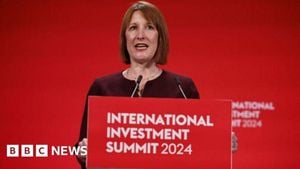Indian actor Vikrant Massey has found himself at the center of controversy and concern following the trailer launch of his upcoming film, The Sabarmati Report. The film, which dives deepinto the sensitive territory of the 2002 Godhra train burning incident, has sparked heated discussions, particularly around the reactions of those who oppose its narrative. Massey recently shared alarming news of receiving death threats aimed at him and his family, which he described as particularly distressing due to the involvement of his infant son, Vardaan.
With the theatrical release set for November 15, 2024, interest and scrutiny have ramped up. According to multiple sources, including Pinkvilla, Massey revealed during interviews how his social media platforms and WhatsApp have been inundated with abusive messages since the trailer went live. "These people know I have a son who is nine months old... They are dragging his name and I am worried about his safety. What society are we living in?" he expressed, highlighting the troubling nature of certain elements within society.
Despite the threats, Massey maintains his stand on not letting fear dictate his and his team's actions. He stated, "I don't fear but feel sorry about such a situation," emphasizing his disappointment at the actions of those sending threats to his family. He explained how they would have pulled the film if they were truly afraid, underscoring the intention of the team to present their story rooted firmly in real events.
Directed by Dheeraj Sarna and featuring actors like Raashii Khanna, Ridhi Dogra, and Barkha Singh, The Sabarmati Report aims to shine a light on the tragic events surrounding the Godhra incident, offering perspectives often overshadowed by political narratives. The movie is produced by Balaji Motion Pictures and Vikir Films, signifying its importance as both a story and as commentary on socio-political dynamics.
Adding another layer to the discourse, Massey confronted accusations levelled at The Sabarmati Report of being politically biased or propagandistic through interviews, including one with NDTV's Arun Singh. He noted the challenges inherent in addressing sensitive topics and the fraught reactions they often invite. "Handling polarizing subjects is demanding. It challenges not just your preparation for the role but how the audience perceives it," he explained.
The backlash extends beyond the film itself, as Massey has faced criticism for his openness about the diversity within his family, which has often landed him on the receiving end of social media trolling. His family background is uniquely interwoven with multiple religions, creating what he believes is a model of inclusivity. His father is Christian, his mother Sikh, and his wife, Sheetal Thakur, is Hindu. Plus, his brother Moeen, who converted to Islam at 17, openly participates in the family’s multi-faith celebrations.
Massey has always taken pride in celebrating the varied traditions within his household. He has highlighted how integral such customs are to their identity, noting how they often come together for Diwali, Eid, and other significant holidays. "My brother does Laxmi puja on the occasion of Diwali. His conversion to Islam is his personal choice, but we celebrate Diwali and Holi together, and on Eid, we enjoy biryani at his place," said Massey. His thoughts on the unity within such diversity extend to breaking stereotypes surrounding interfaith families, making clear he sees this blend as part of India's cultural richness.
While sharing these insights during promotional events for The Sabarmati Report, Massey expressed disappointment over the societal reactions he and his family have faced, calling attention to the need for progressive thinking and acceptance of differences. "This unity is the fabric of our nation; we should be able to celebrate differences rather than allow them to divide us," he added. This emphasis on acceptance speaks volumes not just to his character's beliefs but also his personal convictions.
Adding to the mix, there has been widespread media coverage detailing the threats to Massey, prompting public figures and fans alike to rally their support. Many express concern over the state of free expression and the atmosphere of fear around public discourse on sensitive historical events. The sentiment has ignited debates around censorship, freedom of speech, and societal responsibility.
Massey’s handling of these situations, both personal and professional, paints him as resilient amid adversity. The fact remains, though, the conversations stimulated not just by his film, but by the very real threats and societal reactions to it, demands careful consideration and thoughtful discourse. Upon the imminent release of The Sabarmati Report, coupled with Massey's experiences, the spotlight on these historical narratives becomes ever pivotal, highlighting the need for society to engage thoughtfully with its history and narratives.



